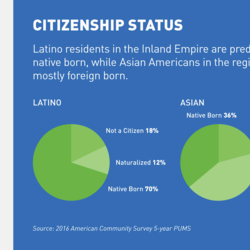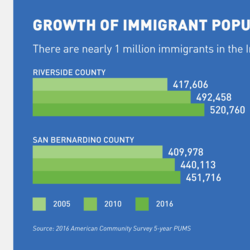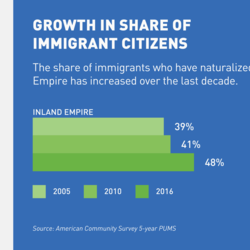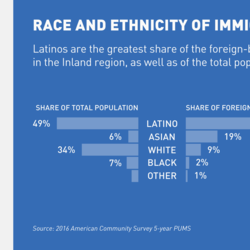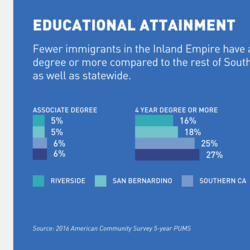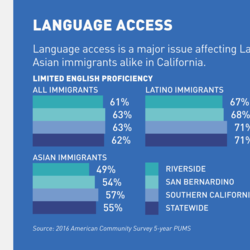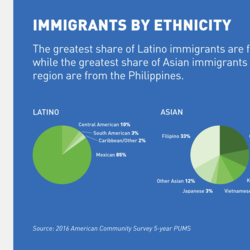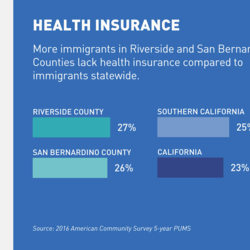Center for Social Innovation
State of Immigrants in the Inland Empire
One in five residents in the Inland Empire is an immigrant. Migration has been a central feature of the region for centuries, and there are now nearly 1 million immigrants living in Riverside and San Bernardino counties. As in decades past, the region’s economic strength and cultural vitality depends on the contributions of immigrants and native born alike.
State of Immigrants in the Inland Empire sets forth the history, resources, and partnerships that support the pressing issues and needs of immigrants in the region. It calls forth key policy issues that have affected—and continue to affect—local immigrant communities. As the region continues to grow, it is important to examine key issues pertaining to its immigrant communities, including poverty, education, employment, and social service needs.
Community Profiles
-
Juanita
Location: Riverside
Age: 40s
Gender: Female
Country of Origin: Mexico Status: Citizen Occupation: Self-employedJuanita’s family history in the United States dates well before her own migration from Mexico, and shows the complexity of family ties across both countries. Juanita and her parents first migrated in 1987 when she was a teenager, but her grandfather had already arrived a
few decades prior, and her older siblings had been in the United States for over 15 years. Juanita’s family intended to visit temporarily, but ended up staying longer to save some money and eventually ended up living in the region permanently.
Most of Juanita’s relatives are naturalized citizens, but some remain undocumented.
Given her own immigration journey, Juanita is actively involved in organizations and groups that advocate for indigenous rights and immigrant rights. Four years ago, she created a grassroots media platform to support and inform immigrant communities about policies affecting them.Education and immigration are among the most pressing issues Juanita cites in the region.
She feels that there is a lack of mentoring and guidance for first-generation college students. As a parent, Juanita feels unfamiliar with the process of getting her daughter prepared for college. On immigration, she feels that the community has been subjected to constant harassment by immigration agencies, often separating family members. She notes that racial profiling, mistreatment, and cooperation between local law enforcement and ICE have created and perpetuated a lack of trust between the immigrant community and local law enforcement.Juanita is hopeful that the current immigration system can be replaced with comprehensive immigration reform that takes into account many factors that are often overlooked or neglected in current immigration policy.
-
Conseulo
Location: Moreno Valley
Age: Late 20s
Gender: Female
Country of Origin: Mexico
Status: DACA Recipient
Occupation: Student, Assistant ProfessorConsuelo lives in the city of Moreno Valley with her parents and two younger siblings, in a mixed immigration status family. Consuelo and her parents immigrated in the U.S. in 2001. In Mexico, Consuelo’s parents’ owned a small business, but lost it after experiencing some financial hardship. Her father immigrated to the United States in order to earn money and send remittances home to ease the family’s financial burden. After Consuelo and her mother experienced threats to their safety, they decided to join Consuelo’s father in the United States. Relatives in the U.S. helped ease the family’s transition to their new home.
Currently, Consuelo works as an assistant professor and is part of a labor union. She is also is completing a fellowship where she works with college-age female students in promoting public service. Consuelo is actively involved in organizations that focused on poverty, empowerment of young women, and environmental justice.
Some of the most pressing issues for Consuelo in her community include limited funding in nonprofits and staff wages. She feels there is not enough investment in non-profit organizations that aim to provide services for community members. According to Consuelo, ”You should be able to live on your own while you’re doing work that’s helpful for the community.” Human rights are a critical concern for Consuelo as she feels that education, healthcare, and fair and safe working conditions should be accessible for everyone, regardless of immigration status.
Consuelo believes that California has different policies that are immigrant friendly, but there are still issues that arise with some of these policies, including rebuilding trust with local law enforcement. Consuelo is most hopeful for future generations to enact meaningful change. She hopes that more people of color and groups that have been marginalized in the past will take more leadership positions in their local communities.
-
Tomasa
Location: San Bernardino
Age: 40s
Gender: Female
Country of Origin: Mexico
Status: Undocumented
Occupation: Self-employedTomasa came to the United States when she was 24 years old. She was only supposed to come for a short period of time, but ended up establishing a life and family here. Tomasa used to live in Los Angeles, she moved to the Inland Empire leaving the frenzy of city life and hoping to spend more time with her family. She currently lives with her husband and their two children in San Bernardino.
Tomasa worked for a fast food company for a long time, but eventually she stopped working due to chronic health problems. After not working for some time, she started a small business of catering and party-rental supplies.
Tomasa feels that it is extremely important to be “good citizens” especially due to her immigration status. She cares about her community and tries to maintain herself informed and active to help the immigrant community. Tomasa wishes that she did not have to use government aid, but she is thankful to be able have access to it to help her cover the cost of the medicine she needs. She felt that she had no choice but to tap into government aid given the high cost of medicine and medical treatment.
Some of the most pressing issues for Tomasa are related to immigrants. She feels that the current administration is not immigrant friendly and it continues to narrow down options for current and future immigrants. Tomasa fears deportation, and how it would affect her US citizen children if the family is forced to move to Mexico. She is also concerned about neighborhood safety, as her family has suffered from robberies and violence.
Tomasa aspires to attain legal status someday. She is also hopeful for the future of her children. She knows that they will have a voice and vote, and she hopes that they can become civic leaders and give back to their community.
-
Mary
Location: Chino Hills
Age: Mid 20s
Gender: Female
Country of Origin: Taiwan
Status: U.S. Citizen
Occupation: Program CoordinatorMary was born in the United States, and her parents were able to migrate through a family sponsorship program from Taiwan. Her parents first migrated to the San Diego area, but eventually were able to purchase a home in the city of Chino Hills. Mary’s parents wanted to provide a better future for their family in a place where they could access more resources.
For the last two years, Mary has been working as a program coordinator for a nonprofit organization. In her profession she designs curricula and conducts training programs. Mary feels that the nonprofit work in the region is severely underfunded, putting downward pressure on both wages and benefits.
In addition to seeing the need for a more inclusive immigration system at the national level and robust implementation of the state’s “sanctuary law” (SB 54), Mary is also concerned about other issues that affect immigrants and their children, including the lack of better jobs in the region, the lack of affordable and accessible health care, and the prevalence of environmental hazards. For her, better jobs means paying fair wages and having predictable hours, meaningful benefits, and safe working conditions. She also feels that there is a lack of representation by elected officials when it comes to environmental issues and policy.
Mary feels lucky that she has not seen increased immigration enforcement in her neighborhood. She believes that one of the reasons is because her family is part of the Asian community, and immigration agencies tend not to not disturb Asian and Pacific Islander communities as much as others.
Mary is most hopeful for people in the region to be engaged in elections and to really know about the issues that affect the Inland Empire. She hopes that one day healthcare can be affordable, accessible and be provided in a culturally competent manner for everyone.
-
Carlos
Location: Palm Desert
Age: 80s
Gender: Male
Country of Origin: Mexico
Status: Permanent Resident
Occupation: RetiredCarlos immigrated with his parents from Mexicali when he was just eight years old. He moved to the Coachella Valley in 1952 to work in the fruit packing industry. He joined the U.S. Army in 1959 and was stationed in Alaska for 18 months.
Upon completing his tour in the Army, Carlos was able to get additional education and training in communications through the GI Bill. He enjoyed working in the telecommunication industry, where he was part of a union, with union benefits. As a member of the union, he regularly attended meetings. He conveyed that the unions he was part of were true allies to their members, regardless of race. And yet, they did not make any extra efforts to assist other community members outside of the labor union.
Some of the most pressing issues for Carlos pertain to health, including lack of government support for the elderly and a lack of outreach on other resources that can be helpful to people like him.
As a child immigrant, Carlos was able to receive permanent residency after living in the Coachella Valley for three years. He feels that it is more difficult for immigrants to obtain legal status now, and he wishes that there were more support for immigrant services today as in the past.
-
Luz Maria & Antonio
Location: Perris
Ages: mid 70s
Country of Origin: Mexico
Status: U.S. Citizen
Occupation: RetiredLuz Maria and Antonio Ayala migrated to the U.S. from Michoacan in 1971. Ever since, the couple has consistently organized for improved working conditions for farm workers and for immigrant legalization.
The Ayalas had been members of Cesar Chavez’s United Farm Workers since 1972, engaging in various advocacy efforts, visiting representatives in their Sacramento and D.C. offices, and educating their representatives about the harsh conditions farm workers were subjected to, such as pesticide exposure that caused chronic, and sometimes fatal, health problems.
They dedicated countless hours to helping farmworkers apply for immigration relief during the early 1980’s. Years later, they reached out to Cesar Chavez to fight against other injustices in their community, including local law enforcement asking for proof of immigration status in the course of routine traffic stops.
Bert Corona, a former faculty member at UC Riverside had a great influence on them, helping them develop skills to successfully organize workers and community members. Their organizing efforts aimed to improve conditions of farmworkers and community members in Indio, Coachella, Blythe and La Cuna de Aztlan.
The couple founded Training Occupational Development Educating Communities (TODEC) in the mid 1980’s in Perris. TODEC’s mission is to ensure equitable access to information, services, community education advocacy, and civic engagement for limited and non-English speaking people including immigrants and migrant workers throughout the Inland Empire.
Some of their early work included career re- training for farmworkers, and has now expanded to provide critical legal services, including assistance with applications for naturalization, DACA, and state driver’s licenses. Today, TODEC is part of a robust network of immigrant-serving organizations in the region.
-
Lilia
Age: 40s
Gender: Female
Location: Redlands
Country of Origin: Mexico
Status: Undocumented
Occupation: Currently in disabilityIn 1995, Lilia immigrated to the US as a single mother. For the first three years, she worked and saved up to have her young daughter come to the US. She currently lives with her husband and her two children that were born in the US. They owned a home but were forced to sell and relocate due to the recession. She is currently on disability after years of repetitive work in the fast food industry. While working, she was prone to harassment, wage theft, discrimination, and other unfair labor practices. She learned about her worker rights through her network with her local church.
She can relate to other undocumented immigrants that live in fear and uncertainty while dealing with family separation. She feels that undocumented immigrants live in the US are forced to remain quiet when they are subjected to discrimination.
According to Lilia, issues related to local law enforcement, immigration policy, and access to affordable housing are the most pressing. She believes that there needs to be immigration reform as well as education on immigration policies for those in need. While many immigrants like her face issues of fear of deportation, Lilia educates herself on immigration policies and is involved with a deportation defense network.
Lilia is hopeful for future generations of immigrants as she prays for more comprehensive immigration reform.
-
Betina
Age: Early 90s
Gender: Female
Location: Coachella
Country of origin: Mexico
Status: Permanent ResidentBetina immigrated to the US in 1943 through a workers visa and moved to the Coachella Valley in 1945. She has worked most of her life in the agriculture industry as a produce packer. She has relied on familial networks to find employment. Through her work as a produce packer, she was able to secure health insurance and seek social services.
Networks play an important role in Betina’s life — provides information on health care and social services, social support, and employment. Her local church provided support in cover funeral costs for one of her family members.
-
Amante
Age: 74
Gender: Male
Location: Riverside, CA
Country of Origin: Philippines
Status: (immigration): Dual Citizen: Canadian & American
Occupation: Currently Retired, Day Trader, Property Owner & ManagerAmante first immigrated from the Philippines to Canada in 1974 but moved to California in the 1980s. With his wife certified as a registered nurse, they were able to apply for a visa within three months. They moved to Long Beach as they had extended family already living there.
Amante first worked as a machine operator and welder, saving up money to later open two dry cleaning businesses. While operating these small businesses located in Fountain Valley and Laguna Beach, he commuted daily from Riverside to Orange County, often leaving for work at 2 or 3 in the morning and returning home at 6 in th evening. After six years, Amante closed his two businesses due to long hours and a hard commute. Later, due to health reasons, he reduced his time working side jobs including as a driving instructor. Upon his retirement, he spends his time traveling and visiting family and friends. He also owns rental properties in Las Vegas, which he manages.
One pressing concern for Amante when it comes to immigrants today is that work and educational opportunities have become more difficult to find. Immigrants today have a harder time owning their own homes and rent is expensive. With this, it becomes difficult to save money to eventually own a home. Yet, he admits that life in the US is still better than in the Philippines.
With Amante’s two sons and his grandchildren, he hopes that the future generations (as descendants of immigrants) do not forget where they came from and the hardships that were faced by their elders that first immigrated to the US. He hopes that future generations still work hard at achieving the American dream. He believes they can achieve anything they want as long as they have a good education. He and his late wife worked hard so that his kids can provide the best opportunities to their own families.
-
San Bernardino Community Service Center
Location: San Bernardino
Year Established: 1998
Regions Served: Riverside & San Bernardino Counties
Services: Immigration ServicesSan Bernardino Community Service Center (SBCSC) provides immigration legal services for people according to eligibility or need including deportation defense, DACA, TPS, asylum, permanent residency or citizenship. SBCSC welcomes everyone to obtain immigration services regardless of immigration status. Services are offered at no cost or based on a sliding fee scale.
SBCSC serves over 3,000 community members in Riverside and San Bernardino counties annually offering immigration legal services that consist of ceasing deportation proceedings and assisting eligible beneficiaries to obtain permanent residency or citizenship status.
The vision for SBSCS is to increase the organization’s capacity to offer legal services to the community by expanding these services to civic or criminal cases.
According to Emilio Amaya, Director of SBSCS, the need for increased funding to support nonprofit organizations serving immigrants in the Inland Empire region is crucial. Emilio believes that his organization is equipped to take the lead in community legal services and deportation defense in the region. However, funding support from philanthropic partners and public agencies is needed, otherwise it is extremely difficult for SBSCS to increase their organizational capacity and provision of legal services. Furthermore, Emilio identified an urgency to educate philanthropic partners and public officials about the unique assets and needs in the Inland Empire.
-
Inland Empire Immigrant Youth Collective (IEIYC)
Location: Ontario
Year Established: 2010
Regions Served: Riverside & San Bernardino Counties
Services: DACA, CA Dream Act, Policy & Advocacy, UndocuHealth Conference, Community outreach and engagement.The Inland Empire Immigrant Youth Collective (IEIYC) is a grassroots organization in the Inland Empire led by undocumented youth. They strive to create a safe space for immigrant youth regardless of immigration status, sexuality or other intersections that are crucial to their undocumented identity. They aim to achieve equal access to higher education and justice for the immigrant community by empowering those who are most affected.
Some of the IEIYC’s biggest accomplishments include being involved in statewide policy and creating change, helping immigrant youth apply for DACA, and financial aid for higher education at no cost. Another remarkable accomplishment is their annual UndocuHealth Conference, which is one of a kind, brining a holistic approach to what health care means. The conference is for and by undocumented immigrants to create conversations about immigrant’s health while attempting to heal generational traumas. The IEIYC’S UMA program connects younger generations and aims to create the next community leaders.
Dianey Murillo, Community Engagement Coordinator at IEIYC, identifies a lack of funding to support their work. For instance, one program currently offers a limited number of scholarships with interest from potential youth participants drastically exceeding it. Supporting an increase in staff capacity would support their efforts in extending outreach efforts in other communities in the IE. In addition, Diany believes that state and local representatives have limited knowledge or understanding of the region and its needs. She believed that by including immigrant youth in the conversation on issues that affect the Inland Empire could help inform policymakers and philanthropy partners alike.
-
CHIRLA – IE
Location: San Bernardino/LA
Year Established: 1986
Regions Served: San Bernardino, Redlands, Fontana
Services: Civic Engagement, Community Education, Legal Immigration Services, Organizing, Policy and AdvocacyThe Coalition for Humane Immigrant Rights (CHIRLA) was founded in 1986. CHIRLA organizes and serves individuals, institutions and coalitions to build power, transform public opinion, and change policies to achieve full human, civil and labor rights. CHIRLA provides services in: Engagement, Community Education, Legal Immigration Services, Organizing, Policy and Advocacy
CHIRLA’s presence in the Inland Empire has grown in recent years. They have worked to strengthen their relationships with local schools, which allowed them to do educational outreach during local elections.
The vision for the organization is for it to grow by increasing staff capacity in the region to strengthen their work and increase outreach efforts within the Inland Empire. CHIRLA Organizer, Mireya Gonzalez, would like to increase their staff capacity in the region and develop programs and services for immigrants and domestic workers.
Gonzalez is currently the only CHIRLA staff member in the region and identified the needs for funding to hire more staff to support the organization’s work and potential.She is concerned about the lack of funding for community organizing, and the need for leadership development and capacity building in the Inland Empire.
-
Warehouse Workers Resource Center (WWRC)
Location: Ontario
Year Established: 2011
Regions Served: West IE /LA
Services: Educational programsWarehouse Workers Resource Center (WWRC) is dedicated to improving working conditions in the warehouse industry in southern California. WWRC provides educational programs to workers and to community members about workers’ safety, rights, wages, workers’ violations. They engage in advocacy for workers and organize and empower workers to demand their rights at the workplace.
Sheheryar Kaoosji, WWRC’s Executive Director, describes some of their biggest accomplishments incorporate assisting workers dealing with issues of health and safety, wage theft and workers’ compensation. One success by WWRC has been able make numerous warehouses take responsibility for workplace discriminatory practices. WWRC won a lawsuit fighting for $30 million dollars in owed back wages for workers. WWRC advocates for policies that encourage improved working conditions, including California Senate Bill 1167 (“Worker Heat Safety Act”) created workplace protections for indoor workers (such as warehouse and factory workers), which was the first policy of its kind in the nation. This state bill protects workers from dangerously high temperatures within warehouses and other work locations. SB 1167 was authored by Senator Connie M. Leyva (D-Chino).
Major retailers like Walmart use the Inland Empire to move their goods to market on the West Coast. The ports of Long Beach and Los Angeles combined are our nation’s busiest and the majority of goods that enter the U.S. from Asia come through these two ports. The Inland Empire is home to the largest concentration of warehouse space in the world.
WWRC’s vision is to bring together workers and community members that are affected by the warehouse industry. According to Kaoosji, local communities need to come together to demand better workplace policies and practices in the warehouse industry. There is a shortage of labor unions and community organizations to advocate for this not only in the workplace but also in local and state policies to protect workers in the warehouse industry.
